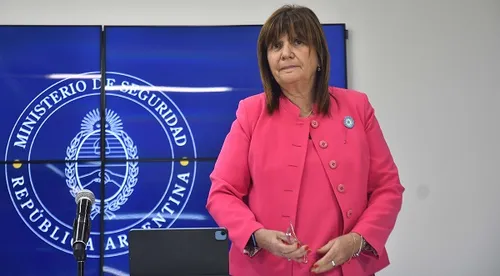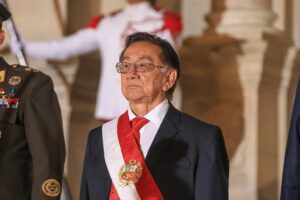
This Friday (15), Javier Milei’s government published a severe protocol that seeks to limit and repress social protests in Argentina. “If they take to the streets, there will be consequences,” warned Patricia Bullrich, Minister of Security, during a press conference.
This is the first measure adopted by the far-right government after the announcement, on Tuesday (12), of a harsh austerity program that will mainly affect the poorest sectors of society. Without compensatory measures for popular sectors in the face of the adjustment, the threat of greater repression appears as the government’s only policy to face the increase in social conflicts in the coming months.
The so-called “protocol for maintaining public order in the face of roadblocks” replaces the “protocol of guarantees” sanctioned in 2011, which limited the use of public force and prohibited the use of lethal weapons and ammunition.
The new rules give federal security forces the power to repress any social protest, which blocks a street or road, without the need for a court order. It also allows security forces to carry out internal intelligence operations – something that is prohibited by the Argentine constitution and international treaties to which the country is bound.
Article 6 of the new protocol establishes that security forces identify protesters and “perpetrators, accomplices and instigators, through filming and other digital or manual means.” To do this, it must carry out a “priority registration of the data of its leaders and the organization to which they are linked.”
Furthermore, it is instructed that the details of registered protesters and “accomplices, instigators and organizers” must be reported to the Ministry of Security for the adoption of “appropriate administrative measures”. In fact, it involves the construction of an internal intelligence registry that will be managed by the Ministry of Security under Bullrich’s control.
Thus, the protocol establishes that the Ministry of Security “may prosecute organizations” using the information collected through this intelligence activity. This allows the persecution of members of social organizations and political collectives, even if they have not directly participated in demonstrations or protests.
The ultra-right government’s resolution makes a special observation in the case of identifying people of foreign origin who participate in the mobilizations. In this sense, he warns that the National Directorate of Migration will be informed so that “appropriate measures” can be taken.
In none of its 15 articles does the new protocol mention the protection of human rights, which Argentina adheres to through international treaties incorporated into the National Constitution and which have a higher hierarchy than any law or protocol.
The right to protest
Different academic and political sectors publicly expressed their rejection of the measure, considering it “anti-democratic” and “unconstitutional”.
“The right to protest is a fundamental right that is in almost all constitutions in the world, because it combines the right to assembly, the right to actively participate in democratic life and, basically, the right to freedom of expression. It is a fundamental freedom for the rule of law”, observed Raúl Gustavo Ferreyra, constitutional lawyer and professor of constitutional law, consulted by Argentine public radio.
“The protocol adopted by the Ministry of Security is manifestly unconstitutional”, warned Ferreyra, adding that “protest is a fundamental right and the regulation of fundamental rights must be discussed in Congress. This should not be done by a minister, through a mere resolution, nor should it be done by the President of the Republic through a decree.”
Next Wednesday (20), social organizations, unions and left-wing parties should carry out a mobilization on the anniversary of the popular rebellion of December 19 and 20, 2001. A popular rebellion against the neoliberal measures applied during the 1990s, which led to the fall of Fernando de la Rúa’s government. The new Minister of Security warned that the forces will act in accordance with the new regulations.
Rights or bullets
In line with the sectors that warn about the unconstitutionality of the protocol, Myriam Bregman, lawyer and national deputy, former presidential candidate for the Left and Workers Front, spoke out.
“What Bullrich announced is absolutely unconstitutional. She is the only one who puts herself in the camp of illegality. The right to protest is the first of rights, without it, they can violate others and there is no way to stop it,” she wrote in your X (formerly Twitter) account.
Immediately, national deputy José Luis Espert, a member of Juntos por el Cambio – the party for which Patricia Bullrich competed for the presidency – shared Bregman’s tweet and wrote in a threatening tone: “Jail or bullet.”
Faced with this situation, legislator Nicolás del Caño, also a member of the Frente de Izquierda y los Trabajadores, wrote: “This cowardly threat from Espert against my colleague Myriam Bregman is extremely serious. All those who defend freedom of expression must repudiate it “. The far-right deputy continued his escalation of threats, responding “for you too parasite (CUIT virgin), who is of no use. Jail or bullet if you break the law.”
The “jail or bullet” threat occurs in a context of increasing violence on the part of the far right in Argentina. Speeches that, given in the spheres of power, legitimize this violence.
Just two days after Milei’s electoral victory, former president Mauricio Macri named as “orcs” those who could carry out protest actions. “They’re going to have to take a good look at the orcs, as I call them, when they want to take to the streets to riot,” he said in a television interview.
According to the Registry of Attacks by Radicalized Argentine Derechas (RADAR), 127 attacks and harassment by the ultra-right were recorded this year.
Editing: Camila Salmazio
Source: www.brasildefato.com.br

